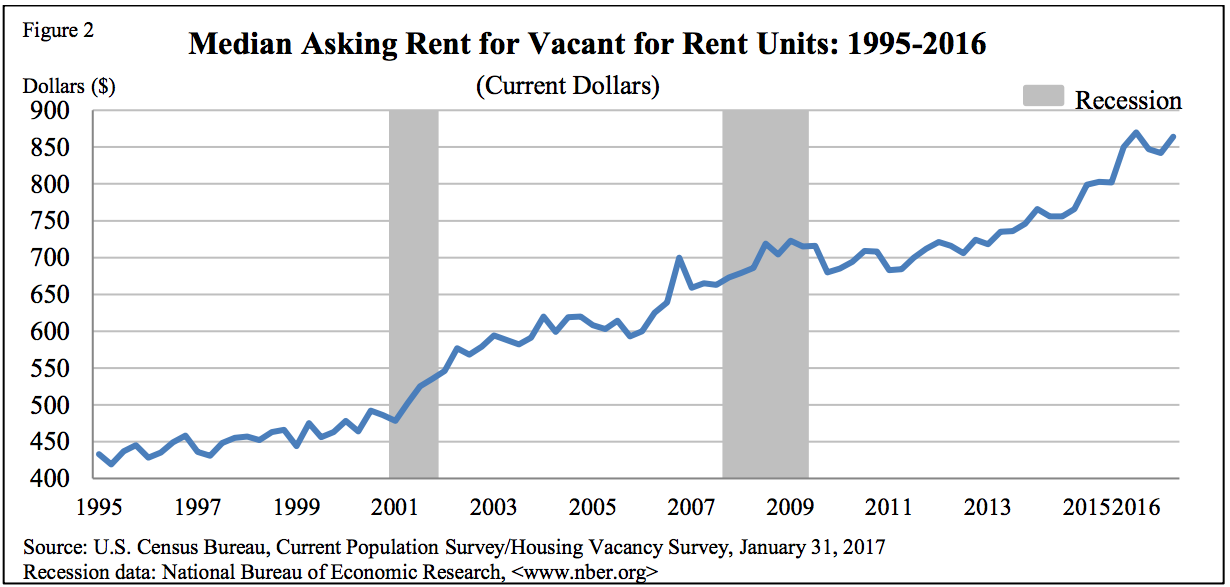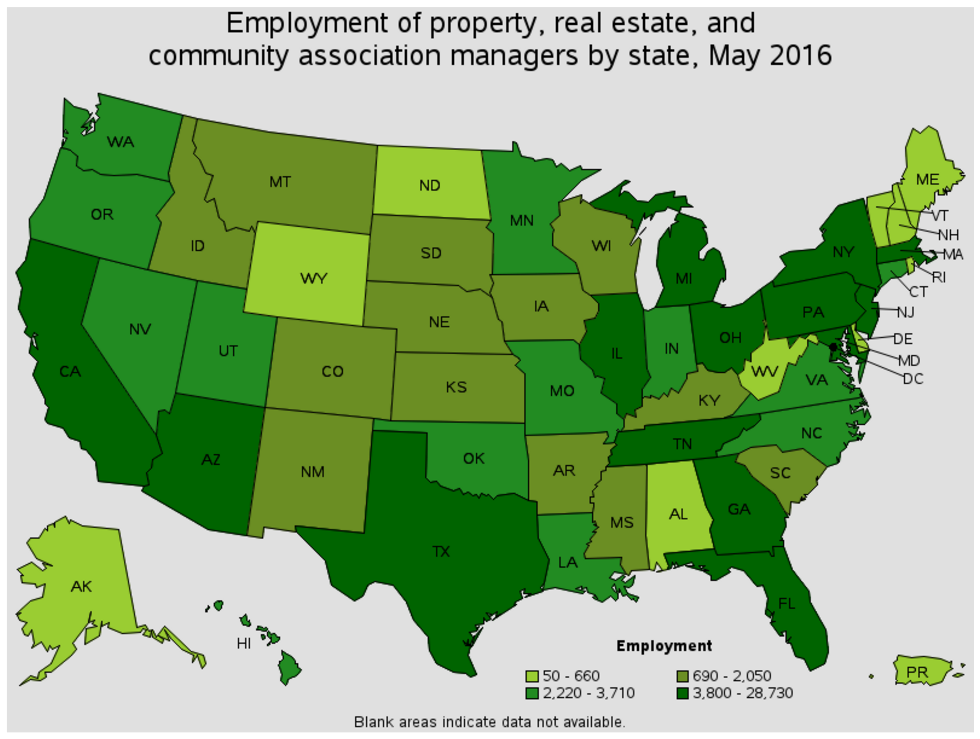Property Management Career Facts
- Median pay: $55,380 per year (Bureau of Labor Statistics, 2014)
- Number of jobs: 313,800 (Bureau of Labor Statistics, 2014)
- Job outlook: 25,300 new jobs to be added over the next 10 years (Bureau of Labor Statistics, 2014)
- Job satisfaction: Among the 20 happiest jobs in the U.S. (CareerBliss, 2014)
—
What is a Property Manager?
Property Management Career Description
Property managers oversee the business responsibilities of real estate that is usually owned by another party. These properties may be small homes, large multi-family buildings, or expansive retail complexes. They are responsible for a variety of tasks, including filing taxes, tenant verification and management, rent collection, and maintenance. They often work unpredictable hours. Property managers need to be familiar with the laws and regulations for real estate in their area, and they must have superb customer service, marketing, and communications skills.
While property managers often oversee the accounting, administrative, and leasing duties in the office, they may also supervise other employees or vendors who manage these tasks.
—
What Does a Property Manager Do?
Property Management Career Responsibilities
On a typical day, property managers are responsible for a number of leasing and administrative duties, including:
- Filing property maintenance service requests
- Collecting rent
- Showing apartments to prospective tenants
- Inspecting units for damage when tenants move out
- Listing vacant properties on the business’ website and placing listings on syndication sites
- Evicting tenants who have violated the terms of their lease
The job of a property manager is so diverse that it is very important to be knowledgeable about all aspects of the rental industry.
—
How the Property Management Industry is Changing: The “Rental Rush”
Due to the increasing costs of buying a home, adults of all ages prefer to rent. As the number of renters increases and home ownership rates hit record lows, the availability of vacant properties decreases. A busy rental market translates into higher demand for property managers.

Source: U.S. Census Bureau
—
Entry-Level Property Management Career Paths
Assistant Property Manager/Leasing Assistant
The assistant property manager provides general office assistance where it’s needed to keep the business running smoothly. Their duties may include:
- Managing the company’s external relations
- Advertising properties
- Communicating with residents
- Entering data
- Accepting and processing rent payments
- Ensuring that maintenance requests are taken care of
- Tracking company expenditures
Just like a property manager, an assistant property manager should have great customer service skills to keep prospective and current tenants happy.
Although many companies hire additional personnel, including administrative assistants and bookkeepers (explained below), the assistant property manager may oversee these responsibilities.
Office Coordinator/Administrative Assistant
Many offices hire an administrative assistant to handle general office work so the property manager can focus on marketing, tenant relations, and maintenance. Their daily tasks may include:
- Answering the phone
- Assisting walk-in customers
- Making apartment showing appointments
- Entering and managing data
- Intaking maintenance requests
- Communicating with vendors
Often acting as the voice of the company, administrative assistants must be able to handle stress in a professional manner, and should know the company’s policies and procedures very well.
Bookkeeper
Some rental agencies hire a bookkeeper to handle the specific financial responsibilities. Their day-to-day tasks may include:
- Receiving and processing rent payments
- Fining residents for late payments
- Filing taxes
- Keeping income and expense records
- Creating financial reports on a yearly or quarterly basis for the property manager and property owner
—
Property Management Career Bio
Carla Toebe, Designated Broker/Owner at CT Realty LLC
Years of Experience: 11
Education:
A.A.S., Business Administration, Columbia Basin College
B.A., Business Administration, Washington State University
How She Got Started:
“I was out of work from a previous layoff and signed up with multiple temp agencies. One day, I received a call to go to work at an apartment complex part-time for $9 an hour. I agreed to go and was trained on showing and writing leases. It had about 250 units in the complex.”
The Next Step:
“I got my next job through a referral from my previous boss. She was going to go to work for another property management company, and the owner asked her if she knew someone who could do all the financial accounting, train site managers, and perform inspections. She gave her my name, and I was hired after interviewing.”
From Manager to Owner:
“Last November, I opened my own brokerage and still do property management, but I mix it up with real estate activities. I feel like I am finally where I need to be, and I am very happy that I had all the experiences I did. They’ve allowed me to grow in many ways that I may not have been able to had I simply started doing property management one day as a realtor in a brokerage and just winged it, like so many do. I really knew the laws, and I had the opportunity to have a lot of high-volume experience that enabled me to handle almost anything.”
Advice for Prospective Property Managers:
“I believe that anyone who wants to be a good property manager should be an assistant first. Try to get your foot in the door as a leasing agent at an apartment complex.”
—
Property Management Career Skills, Qualifications & Training
Property Management Certifications & Education
While many property management careers do not require a college degree, a specialized accreditation shows that you are serious and knowledgeable about your career. Some companies prefer applicants with a college degree in business, accounting, or real estate. With these degrees, property managers can be sure that candidates have learned the skills required in this business. Relevant work experience is always beneficial to a job search, and internships show dedication and basic knowledge of the industry.
If you’re serious about a career in property management, you may want to consider earning a certificate to further your career. Becoming a CPM (Certified Property Manager) or an ARM (Accredited Residential Manager) is very beneficial to a career in real estate. An ARM certification in particular shows that a person has demonstrated the ability to succeed and exceed employer and client expectations. They are an investment, but they tend to pay for themselves in the job opportunities that they unlock.
To learn more about whether you should get certified, read our post on property manager certification.
Customer Service Skills
The property manager is expected to fill empty properties and keep them that way. This means that he or she must represent the business in a way that makes people want to interact with the company’s personnel. In today’s technological world, information travels very quickly, so it behooves the property manager to build a positive reputation for the company.
Relationship management is essential at every stage of the rental process:
- Prior to the lease signing: Rent should be set at a rate that covers the costs of property maintenance, but it shouldn’t be so high that it alienates apartment hunters.
- At lease signing: The lease itself should be used to explain every formality in detail so the tenant knows exactly what to expect.
- For the duration of the lease: The property manager should strike a balance between being responsive and amicable, but also professional and firm. This is especially important when dealing with maintenance issues, but also if the lease has been breached or the rent hasn’t been paid.
- When the lease is up: The property manager will need to inspect the apartment and provide adequate explanations for any portion of the security deposit that wasn’t returned to the tenant.
Administrative Skills
A successful property manager should be able to handle all aspects of the business. This includes collecting and processing rent payments, paying the company’s bills, entering data and creating reports, and maintaining an overall productive office environment. As mentioned above, customer service skills are key, as without tenants to fill each unit, there is no business. Maintaining healthy communication with tenants, maintenance staff, and the surrounding community greatly benefits the business.
—
Property Management Career Growth & Salaries
According to the Bureau of Labor Statistics, the median wage for property, real estate, and community association managers in May 2015 was $55,380. The bottom 10% earned less than $28,490, while the top 10% earned more than $123,790. For reference, the median salary across all occupations in the U.S. in May 2015 was $36,200.
Jobs in this sector are expected to grow at a rate of 8% between 2014 and 2024, which is the average rate of job creation for most industries. These jobs do not require extensive experience and education, so the return on your investment in time and money ends up being quite good. The most profitable division of property management currently lies in the local government sector, which does not include education and hospitals.
—
Property Management Career Trends by State

Source: Bureau of Labor Statistics
—
Property Management Career Resources
National Associations
NARPM: The National Association of Residential Property Managers serves as a home base for the profession, where people can share advice, network with other professionals in the field, attend conferences, and take steps toward earning a certificate.
NAR: The National Association of Realtors is a more generalized resource, catering to all positions in the real estate world and reporting on industry trends.
NPMA: The National Property Management Association is a resource solely for property managers and those generally in charge of their respective organizations. It provides education as well as networking opportunities.
IREM: The Institute of Real Estate Management provides everything from education to real estate trends, and blogs from those in the business to career resources.
General Information
Legal Resources
- The Office of Fair Housing and Equal Opportunity
- Real Estate Laws Affecting Transactions
- 23 Laws That Apply to Real Estate Sales
- Real Estate Laws in Your State (U.S. Department of Justice)
- Forums for Real Estate and Property Law
Finding a Job
- Indeed’s Property Management Jobs
- PropertyManagerJobs.com
- Career Builder’s Property Management Jobs
- Monster’s Property Management Listings
- Glassdoor’s Property Manager Jobs
—
Additional Property Management Career Advice and Interview Tips
It’s important to be sure that property management is the career that you truly want before you take steps toward pursuing it. It can be intense to be in such a customer-driven, around-the-clock position, so it’s not meant for everyone. If you’re ready to take the next step into property management, however, the following tips may be helpful:
- Don’t focus on a single aspect of property management if it means neglecting the rest. Property managers often handle every aspect of the business, so employers appreciate knowing that a potential hire has a variety of skills.
- Show that you are capable of making rational, informed decisions. You may often have to call the shots on your own rather than deferring to your supervisor.
- Be prepared to immerse yourself in the business. If you approach a property management career halfheartedly, you won’t perform to your full potential, and the business will suffer as a result.
- Ask questions! This tip is Interviewing 101, but it is often overlooked. Employers appreciate knowing that an applicant is genuinely interested in the property management business, as it foreshadows long-term commitment and loyalty.


